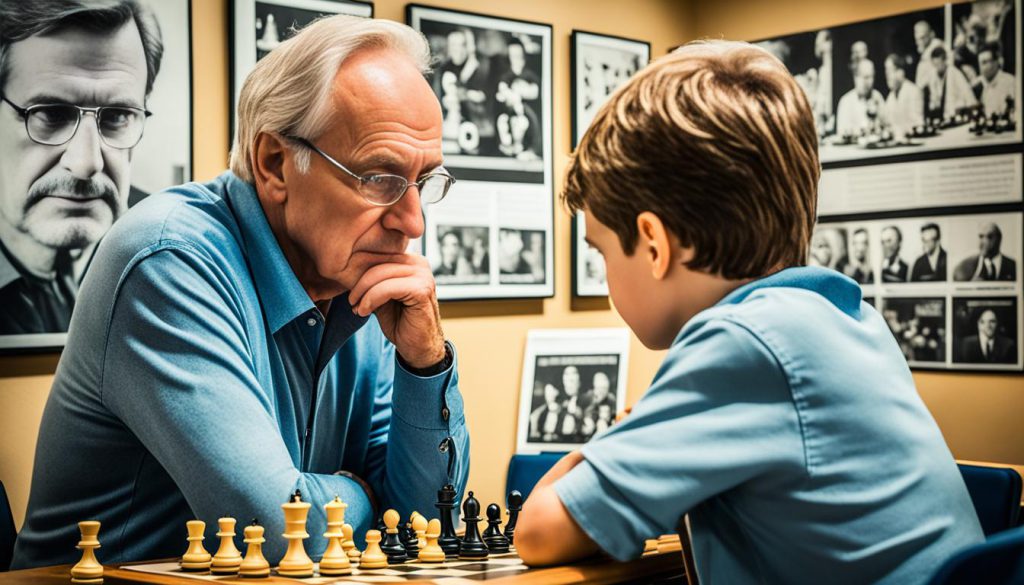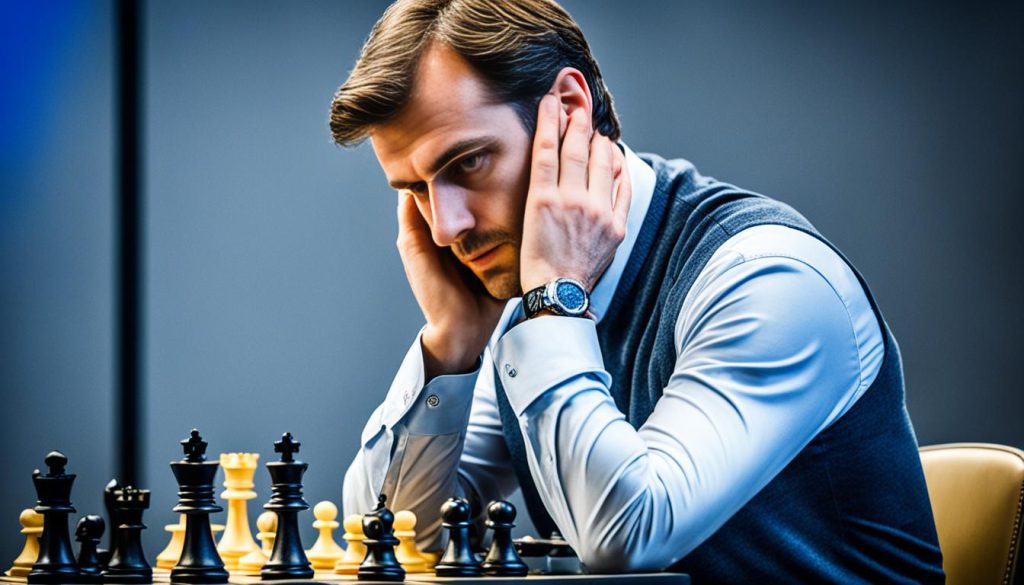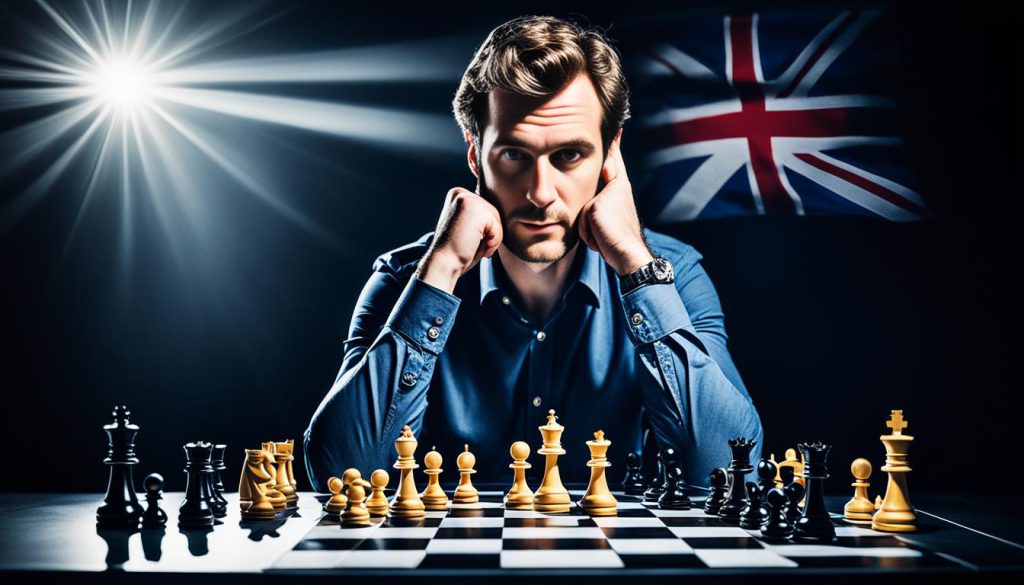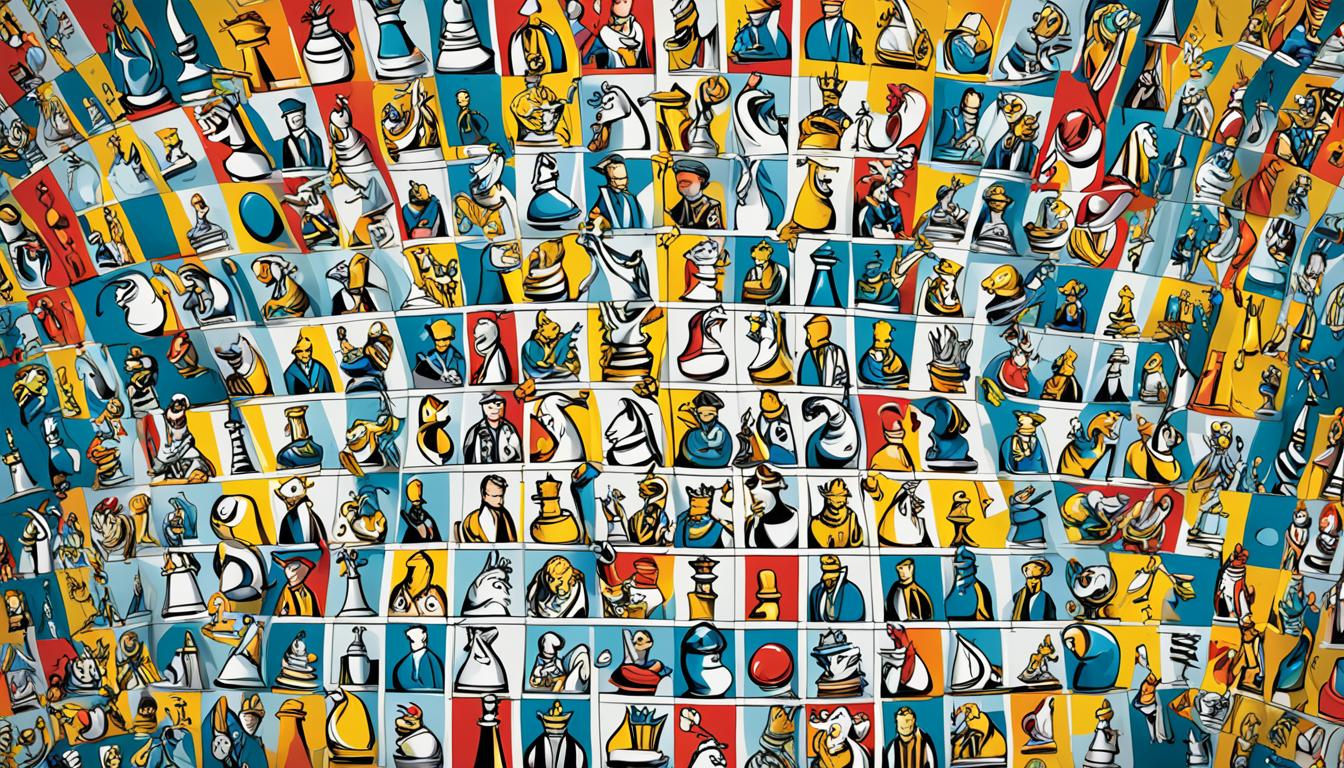Did you know chess has brought us some of the most famous people in sports and strategy? These individuals, from champions to grandmasters, have truly made their mark. We’ll look at their life stories, shining moments, and how they’ve helped the chess world. Let’s honor these legendary figures who have shaped how we see chess.
Key Takeaways:
- Chess has produced celebrated figures who have made significant contributions to the game.
- These popular chess players are renowned for their strategic brilliance and remarkable achievements.
- Their impact extends beyond the chessboard, inspiring the next generation of chess enthusiasts.
- Join us as we honor these icons and explore their fascinating stories in the world of chess.
- Learn from their tactics, victories, and noteworthy roles in coaching and chess theory.
Evgeny Sveshnikov: A Master of Chess Theory
Evgeny Sveshnikov, a Russian-Latvian grandmaster, changed chess theory in the 1970s. He was a master of chess openings. One key achievement was creating the Sveshnikov Variation in the Sicilian Defense. This strategy is used by top players like Magnus Carlsen.
He had a deep understanding of chess. By looking at many games and trying new moves, he pushed chess knowledge further. His ideas made players think of new ways to win.
Sveshnikov wasn’t just a player. He also coached, sharing his wide knowledge. He helped greats like Anatoly Karpov and Alexandra Kosteniuk, the 12th Women’s World Chess Champion.
Contributions to Chess Theory
Evgeny Sveshnikov researched and analyzed chess openings deeply. He challenged old ideas, giving new ones to the world. His work on the Sveshnikov Variation changed the game.
“By developing the Sveshnikov Variation, I aimed to introduce a tactical approach to the Sicilian Defense. This gives players exciting ways to win.” – Evgeny Sveshnikov
This opening lets Black move d7-d5 early, making the game open for both sides. The Sveshnikov Variation has been deeply analyzed. It’s a favorite for its rich tactics.
An Accomplished Coaching Journey
Sveshnikov also excelled as a coach. He guided chess players, helping them use their full potential. He worked with Anatoly Karpov and Alexandra Kosteniuk, boosting their skills.
His work with Karpov was especially important. He gave strategic advice and analyzed games. This helped Karpov become one of the greatest players ever.
He also helped Alexandra Kosteniuk win the Women’s World Chess Championship. His training and advice were key to her success.
The Sveshnikov Legacy Lives On
Evgeny Sveshnikov’s ideas and coaching still influence chess today. His contributions to openings and game strategy motivate players at all levels. The Sveshnikov Variation is still a strong choice for ambitious players, showing Sveshnikov’s ongoing impact.
Carol Jarecki: A Trailblazer in Chess Arbitration
In the chess world and the famous World Chess Championship, Carol Jarecki shines. She was the first woman to be a chief arbiter at a championship match. This left a lasting impact on the chess community.
Carol Jarecki made history in 1989. She was in charge of the match between Anatoly Karpov and Johann Hjartarson. She showed her excellent skills and fairness, earning wide respect.
“Carol Jarecki’s professionalism and dedication as the chief arbiter for the quarterfinal match between Karpov and Hjartarson set a new standard for excellence in chess arbitration. Her trailblazing role broke barriers and paved the way for more women to contribute in powerful ways to the world of chess.”
But Jarecki didn’t stop there. In 1995, she was the chief arbiter again, for the match between Garry Kasparov and Viswanathan Anand. She proved her ability to handle big pressure at such a major event.
Carol Jarecki also directed many important tournaments. This boosted her status in the chess world even more.
Want to know more about Carol Jarecki’s big impact on chess arbitration? Check the table below for her key achievements:
| Tournament/Event | Year |
|---|---|
| Quarterfinal match arbiter – Karpov vs Hjartarson | 1989 |
| World Chess Championship arbiter – Kasparov vs Anand | 1995 |
| Director of numerous prestigious tournaments | N/A |
Carol Jarecki’s hard work, professionalism, and pioneering spirit have inspired many in the chess world. She set new standards and encouraged future chess arbiters. We are thankful for Carol Jarecki’s major impact on chess.
Shri K. Viswanathan: A Supportive Father and Chess Enthusiast
In chess, a father-son bond is crucial. It can shape a player’s path and victories. Shri K. Viswanathan and his son, Viswanathan Anand, the ex-world chess champion, are a prime example. Since Anand’s early chess days, his father has been his biggest supporter and guide.
At first, Viswanathan doubted his son could be a world champion. But Anand’s skill and willpower soon changed his mind. Viswanathan saw his son’s incredible talent grow and was his support throughout his career.
Beyond chess, they shared a deep bond. Viswanathan’s advice shaped Anand’s character and strategies. They tackled the highs and lows of chess together, learning from each victory and defeat.
“My father always believed in me, even when I had doubts about myself. He encouraged me to chase my dreams and provided the support and love I needed to thrive in both chess and life.”
Anand’s rise to world champion wasn’t just about chess. It highlighted a strong father-son bond, driven by passion and mutual respect. Viswanathan’s faith in Anand and his presence at events strengthened their connection.
Throughout his career, Anand said his dad shaped his gaming approach. He learned to stay humble, focused, and remember what’s important. Thanks to his father’s support, Anand rose to the top of the chess world.
Though Viswanathan initially hesitated, their commitment to chess led Anand to greatness. Their story shows how a father’s support can deeply influence a child’s success.
This story of Shri K. Viswanathan and Viswanathan Anand shows the priceless role parents have in their children’s lives. It teaches us that a world champion’s journey is often backed by a family’s love and belief.

Lubomir Kavalek: From Czechoslovakia to American Chess Legend
Lubomir Kavalek became famous as a Czech-American grandmaster. He was known for his incredible talent and determination. Born in Prague, he lived through tough times in the Soviet bloc. Later, he made the United States his home, making a big impact on chess there.
Kavalek left Czechoslovakia in 1968 due to political problems. He moved to the United States, seeking freedom and opportunities. This move was key for his chess career. It opened new doors and led him to great success.
Kavalek wasn’t just good at playing chess. He also helped Bobby Fischer in the famous 1972 World Chess Championship against Boris Spassky. Their work together helped Fischer win, putting Kavalek in the chess history books.
The U.S. Chess Hall of Fame Induction
Kavalek was honored with an induction into the U.S. Chess Hall of Fame. This celebrated his amazing skill, smart strategies, and big impact on chess. It confirmed his place as a chess legend in America.
Kavalek’s story is about a boy from Czechoslovakia who became a famous grandmaster in the U.S. It shows how chess can bring people together across the world. His story inspires chess players everywhere to keep trying and aiming high.
“Chess is not just a game; it is a reflection of life’s challenges and triumphs. Through my personal journey, I hope to inspire others to embrace their passions and pursue greatness.” – Lubomir Kavalek
Lubomir Kavalek’s life shows how chess can change lives and leave a lasting legacy. Next, we’ll look at Jonathan Penrose and his big achievements in chess.

Jonathan Penrose: British Chess Champion and Pioneer
Jonathan Penrose, a celebrated British chess player, stood out for his skillful play. He won the British Chess Championship 10 times, a record. His victories showed his strategic genius and deep game knowledge.
Penrose’s most notable win was against Mikhail Tal at the 1960 Olympiad. He became the first Brit in 60 years to beat a reigning world champion. This victory proved his elite status.
In correspondence chess, Penrose also shined, adapting his strategy for this game form. He became a grandmaster of correspondence chess, topping the rankings.
Jonathan Penrose made a lasting impact on British chess, inspiring many. His strategic smarts, competitive nature, and adaptability made him a chess pioneer.

| Tournament | Year | Result |
|---|---|---|
| British Chess Championship | 1958 | 1st Place |
| British Chess Championship | 1961 | 1st Place |
| British Chess Championship | 1962 | 1st Place |
| British Chess Championship | 1963 | 1st Place |
| British Chess Championship | 1966 | 1st Place |
| British Chess Championship | 1969 | 1st Place |
| British Chess Championship | 1970 | 1st Place |
| British Chess Championship | 1972 | 1st Place |
| British Chess Championship | 1973 | 1st Place |
| British Chess Championship | 1974 | 1st Place |
Yury Dokhoian: The Brilliant Chess Coach
Yury Dokhoian was more than a chess coach. He understood chess deeply, both its theory and how players think. His skills in analysis made him a great teacher. I was lucky to see his coaching and its effects on some top players.
Garry Kasparov, one of the best chess players, was taught by Dokhoian for ten years. Dokhoian helped Kasparov sharpen his skills and win against tough opponents. With his coach’s help, Kasparov became the world champion.
Dokhoian also helped other top players, including Sergey Karjakin. Karjakin became one of the youngest grandmasters ever. Dokhoian’s detailed planning and his way of bringing out the best in his students were key to their achievements.
But in 2021, Dokhoian’s life was sadly cut short by COVID-19. His death left a big gap in the chess world. Everyone who knew him felt the loss of a great chess coach.
Yury Dokhoian’s name will always be remembered in chess. He was a brilliant coach who loved the game. His influence will motivate chess players in the future. Even though he’s gone, his effect on chess won’t be forgotten.
The Impact of Yury Dokhoian
“Dokhoian’s insights into the game and his ability to dissect complex positions were unparalleled. He was not just a coach; he was a mentor and a guide, helping us navigate the intricacies of chess and develop our own unique styles of play.” – Garry Kasparov
“I will always be grateful for the time I spent working with Dokhoian. He taught me to think beyond the board, to study my opponents’ mentalities, and to use chess as a tool for personal growth. His wisdom and guidance will forever be etched in my mind.” – Sergey Karjakin
| Yury Dokhoian’s Accomplishments | Year |
|---|---|
| Coach to Garry Kasparov | 1985-1995 |
| Continued coaching elite players | 1996-2021 |
| Contributions to chess preparation | Ongoing |
Odion Aikhoje: Nigerian Chess Icon for Independence Celebration
Odion Aikhoje is an International Master from Nigeria. He shows the world the talent and hard work of Nigerian chess players. He was celebrated as one of Nigeria’s top 60 sports icons for the country’s 60th Independence anniversary.
Aikhoje is known for his amazing achievements. At the 1998 World Chess Olympiad, he stood out by winning an Individual Gold Medal. This win made him known as a powerful player in the chess world.
This honor reminds us of how chess has grown in Nigeria. It shows how important chess has become as a sport. It also celebrates the hard work of players like Aikhoje.
Aikhoje’s award makes us think of a bright future for chess. It motivates young players to follow their dreams. It encourages them to help chess grow in Nigeria and the world.
We should all back and encourage chess players like Odion Aikhoje. This will help create a strong and exciting chess culture. Such a culture will add to the global chess community.
World Chess Olympiad Gold Medal Winners from Nigeria
| Year | Player | Medal |
|---|---|---|
| 1998 | Odion Aikhoje | Gold |
| … | … | … |
| … | … | … |
New Features on Chess.com: Enhancing the Chess Experience
Chess.com is growing to make your online chess better. It now has three new features to make online chess more fun and engaging. These changes help players from all corners of the globe connect and play.
Quick Chat: Communicate with Emoji
Need to talk during a game? Chess.com’s Quick Chat lets you do that with cool chess emoji. Say “great move” or just be friendly in a brand-new way. Quick Chat brings players closer, adding fun to every game.
Board Emoji: Bring Your Chessboard to Life
With Board Emoji, your chessboard gets a whole new look. Use emojis to highlight moves or show off your creativity. It turns your board into a living story, making each game a unique experience.
Community Contest: Showcasing Board Emoji Creators
The Chess.com Community Contest is here to spot creative geniuses. Use Board Emoji in your chess content to win. Chess.com will reward the coolest, most creative uses. It’s a chance to shine among the chess community.
Reactions: Share Your Thoughts and Feedback
Your opinion matters at Chess.com. With Reactions, it’s easy to share what you think. Like an article? Have an idea for improvement? Reactions lets you speak up and connect with the community.
These features aim to improve your chess game and bring us together. Sign up for Chess.com and explore new ways to enjoy chess with people worldwide.
Conclusion
As we wrap up our journey through the lives of famous chess players, it’s clear how much they’ve shaped chess. Their brilliant strategies, deep dedication, and contributions have left a lasting mark. They have molded the community and the game’s legacy.
We honor these legendary players by recognizing their incredible talent. Their stories motivate us and show that dedication and love for chess pay off. Their achievements encourage future chess masters.
We should keep celebrating chess’s rich history and lively community. By doing so, we respect those who have made significant contributions. Let’s make sure their achievements are remembered and celebrated for years to come.

